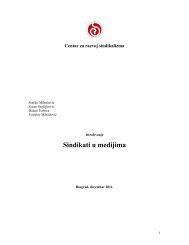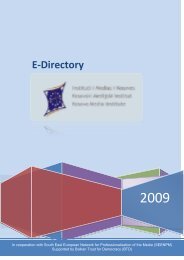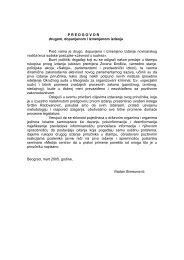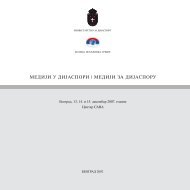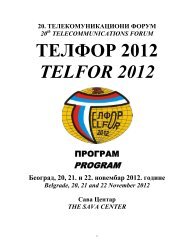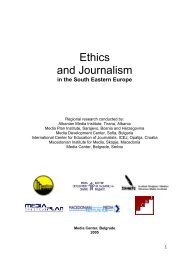Media Study - Medija centar Beograd
Media Study - Medija centar Beograd
Media Study - Medija centar Beograd
Create successful ePaper yourself
Turn your PDF publications into a flip-book with our unique Google optimized e-Paper software.
and Information Society. Furthermore, RATEL and RBA should present legislators with a solution to the piracy<br />
issues. RBA should be encouraged to establish detailed criteria for granting broadcasting licenses and establish<br />
objective criteria as to how to evaluate these criteria and how to balance them. This reduces the risk of having<br />
decisions made by the Council perceived as arbitrary by stakeholders in the media sector. The arms length’s<br />
principle for decisions, recommendations and policy preparations should be encouraged by increased capacity for<br />
decisions taken on the administrative level and by sub-committees with independent experts. The recently<br />
established Press Council appears to have full independence in handling complaints and self-regulating the sector<br />
and appears to be an ideal model of self-regulation imposing generally accepted press standards. It should,<br />
however, be kept in mind that even in well established democracies Press Councils have not always fulfilled their<br />
role without involvement from the state. If this appears to be the case in the future, pragmatic solutions may have<br />
to be found.<br />
The transition to digital broadcasting will have clear implications for the media landscape and require firm political<br />
decisions. Compared to many EU Member States Serbia is privileged with a high number of national frequencies for<br />
terrestrial broadcasting. The digital switch will serve as an opportunity to streamline and adjust the number of<br />
broadcasters to match the actual size of the market in Serbia. Those local television stations that do not have the<br />
capacity or desire to engage in regional broadcasting will close. Apart from passing new legislation on<br />
telecommunications, it is necessary to adopt decisions/bylaws on commercial licenses and spectrum addressing the<br />
situation following the digital switch- over, to make decisions concerning the digital dividend including technical<br />
regulation on interference, and to plan the economic model and the activities recommended in the action plan<br />
To ensure the optimal Digital Dividend for Serbia RBA is recommended to establish an expert committee with 7-10<br />
representatives from the media, cable, public administration, culture and industry sectors to prepare a coherent<br />
strategy and action plans for the Digital Dividend for Serbia over the next 10 years.<br />
License fees can support broadcasting in several institutional formats that all fall within EU standards and practices.<br />
It is the national public service broadcaster as RTS, it is regional public service broadcasters as proposed in this<br />
study, it is public service programmes produced by private, commercial broadcasters, and it is minority<br />
programmes or film production for broadcasting. Instead of a variety of decentralized funding mechanisms that<br />
each of them must be equipped with protection against undue interference into editorial content the license fees<br />
should be collected nationally through a body with public authority. On top of the anticipated license fees for RTS<br />
as stipulated by law, 8 % should be provided for the system of regional public service broadcasters, 2 % for the<br />
regional system to deliver specialized programmes from the regional public service broadcasters to RTS, 5 % for<br />
grants supporting production and broadcasting of public service programmes on private, commercial broadcasters,<br />
2 % for support to civil sector radio and television, and 2 % as support to a fund for production of quality minority<br />
programmes. Eventually all license fees could be collected by public authorities and allocated into an independent<br />
media fund or similar construction.<br />
Municipal ownership, direct financing and appointment of management of the local media should be brought to an<br />
end and all state interventions and public media support, except license fees should be minimized. Private news<br />
agencies should reshape portfolio of their services to deliver information and research in those areas, where a<br />
“heavy” national institution is not suitable. TANJUG should undergo transformation into a public institution,<br />
supported by the state on basis of a contract, focusing according to its re-definition and transformation on strictly<br />
defined public services, i.e. services which are not to be delivered by independent private companies (e.g.<br />
systematic national archive, regional correspondence with less marketing attraction, research engines,<br />
publications, etc.). If acting in the area of market products competing with private press agencies, the public<br />
108



